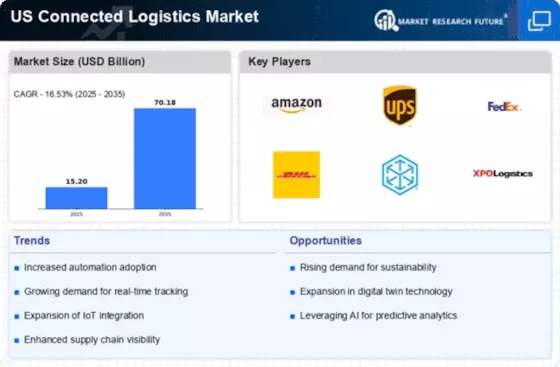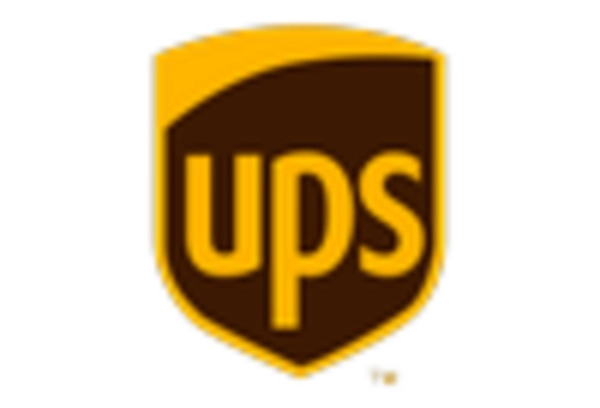Rising E-commerce Activities
The US Connected Logistics Market is significantly influenced by the rapid growth of e-commerce activities. With online shopping becoming increasingly prevalent, logistics companies are under pressure to adapt their operations to meet the demands of fast and efficient delivery. Data indicates that e-commerce sales in the US have reached over 900 billion dollars, necessitating a robust logistics infrastructure. This surge in e-commerce is prompting logistics providers to invest in connected logistics solutions that facilitate last-mile delivery and improve inventory management. As businesses strive to enhance their service offerings and maintain competitive advantages, the integration of connected logistics technologies is likely to become a priority, further propelling the growth of the US Connected Logistics Market.
Focus on Cost Reduction Strategies
The US Connected Logistics Market is increasingly characterized by a focus on cost reduction strategies among logistics providers. Companies are under constant pressure to minimize operational costs while maintaining service quality. Connected logistics solutions, such as automated inventory management and predictive analytics, offer opportunities for significant cost savings. By optimizing routes and improving resource allocation, logistics firms can reduce fuel consumption and labor costs. Recent studies suggest that companies implementing connected logistics technologies can achieve cost reductions of up to 20%. This emphasis on cost efficiency is driving the adoption of connected logistics solutions, as organizations strive to enhance their profitability in a competitive market. As a result, the focus on cost reduction is likely to be a key driver of growth in the US Connected Logistics Market.
Growing Demand for Real-Time Tracking
The US Connected Logistics Market is experiencing a notable surge in demand for real-time tracking solutions. Companies are increasingly recognizing the value of visibility in their supply chains, which allows for enhanced decision-making and operational efficiency. According to recent data, approximately 70% of logistics companies in the US have adopted some form of real-time tracking technology. This trend is driven by the need to improve customer satisfaction and reduce delays. As consumers expect timely deliveries, businesses are compelled to invest in connected logistics solutions that provide accurate tracking information. This growing demand for transparency in logistics operations is likely to propel the US Connected Logistics Market further, as organizations seek to leverage technology to meet customer expectations and optimize their supply chain processes.
Advancements in Supply Chain Technology
The US Connected Logistics Market is witnessing a wave of advancements in supply chain technology, which is reshaping logistics operations. Innovations such as blockchain, artificial intelligence, and machine learning are being integrated into logistics processes, enhancing efficiency and accuracy. These technologies enable better data sharing and collaboration among supply chain partners, which is essential for optimizing logistics operations. As companies increasingly recognize the potential of these advancements, investments in connected logistics solutions are expected to rise. The integration of cutting-edge technologies not only streamlines operations but also provides a competitive edge in the market. Consequently, the ongoing technological evolution is likely to drive the growth of the US Connected Logistics Market, as firms seek to leverage these innovations to improve their supply chain performance.
Regulatory Support for Digital Transformation
The US Connected Logistics Market is benefiting from increasing regulatory support aimed at promoting digital transformation within the logistics sector. Government initiatives, such as the Federal Motor Carrier Safety Administration's (FMCSA) efforts to enhance safety and efficiency through technology, are encouraging logistics companies to adopt connected solutions. These regulations often incentivize the use of advanced technologies, including IoT and data analytics, which are crucial for the development of connected logistics. As a result, logistics firms are more likely to invest in innovative solutions that align with regulatory requirements. This supportive regulatory environment is expected to drive growth in the US Connected Logistics Market, as companies strive to comply with evolving standards while enhancing their operational capabilities.
















